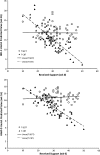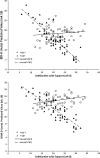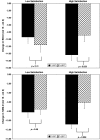Telephone-administered psychotherapy for depression in MS patients: moderating role of social support
- PMID: 19941048
- PMCID: PMC2813530
- DOI: 10.1007/s10865-009-9235-2
Telephone-administered psychotherapy for depression in MS patients: moderating role of social support
Abstract
Depression is common in individuals with multiple sclerosis (MS). While psychotherapy is an effective treatment for depression, not all individuals benefit. We examined whether baseline social support might differentially affect treatment outcome in 127 participants with MS and depression randomized to either Telephone-administered Cognitive-Behavioral Therapy (T-CBT) or Telephone-administered Emotion-Focused Therapy (T-EFT). We predicted that those with low social support would improve more in T-EFT, since this approach emphasizes the therapeutic relationship, while participants with strong social networks and presumably more emotional resources might fare better in the more structured and demanding T-CBT. We found that both level of received support and satisfaction with that support at baseline did moderate treatment outcome. Individuals with high social support showed a greater reduction in depressive symptoms in the T-CBT as predicted, but participants with low social support showed a similar reduction in both treatments. This suggests that for participants with high social support, CBT may be a more beneficial treatment for depression compared with EFT.
Figures




References
-
- Aikens JE, Reinecke MA, Pliskin NH, Fischer JS, Wiebe JS, McCracken LM, et al. Assessing depressive symptoms in multiple sclerosis: Is it necessary to omit items from the original Beck Depression Inventory? Journal of Behavioral Medicine. 1999;22(2):127–142. doi: 10.1023/A:1018731415172. - DOI - PubMed
-
- Beck JS. Cognitive therapy: Basics and beyond. New York: Guilford Press; 1995.
-
- Beck AT, Rush AJ, Shaw BF, Emery G. Cognitive therapy of depression. New York: Guilford; 1979.

